Slow advancement of enteral feed volumes to prevent necrotising enterocolitis in very low birth weight infants
- PMID: 34427330
- PMCID: PMC8407506
- DOI: 10.1002/14651858.CD001241.pub8
Slow advancement of enteral feed volumes to prevent necrotising enterocolitis in very low birth weight infants
Abstract
Background: Early enteral feeding practices are potentially modifiable risk factors for necrotising enterocolitis (NEC) in very preterm or very low birth weight (VLBW) infants. Observational studies suggest that conservative feeding regimens, including slowly advancing enteral feed volumes, reduce the risk of NEC. However, it is unclear whether slow feed advancement may delay establishment of full enteral feeding, and if it could be associated with infectious morbidities secondary to prolonged exposure to parenteral nutrition.
Objectives: To determine the effects of slow rates of enteral feed advancement on the risk of NEC, mortality, and other morbidities in very preterm or VLBW infants.
Search methods: We searched CENTRAL (2020, Issue 10), Ovid MEDLINE (1946 to October 2020), Embase via Ovid (1974 to October 2020), Maternity and Infant Care database (MIDIRS) (1971 to October 2020), CINAHL (1982 to October 2020), and clinical trials databases and reference lists of retrieved articles for eligible trials.
Selection criteria: We included randomised or quasi-randomised controlled trials that assessed effects of slow (up to 24 mL/kg/d) versus faster rates of advancement of enteral feed volumes on the risk of NEC in very preterm or VLBW infants.
Data collection and analysis: Two review authors separately evaluated trial risk of bias, extracted data, and synthesised effect estimates using risk ratio (RR), risk difference (RD), and mean difference. We used the GRADE approach to assess the certainty of evidence. Outcomes of interest were NEC, all-cause mortality, feed intolerance, and invasive infection.
Main results: We included 14 trials involving a total of 4033 infants (2804 infants participated in one large trial). None of the trials masked parents, caregivers, or investigators. Risk of bias was otherwise low. Most infants were stable very preterm or VLBW infants of birth weight appropriate for gestation. About one-third of all infants were extremely preterm or extremely low birth weight (ELBW), and about one-fifth were small for gestational age, growth-restricted, or compromised as indicated by absent or reversed end-diastolic flow velocity in the foetal umbilical artery. Trials typically defined slow advancement as daily increments of 15 to 24 mL/kg, and faster advancement as daily increments of 30 to 40 mL/kg. Meta-analyses showed that slow advancement of enteral feed volumes probably has little or no effect on the risk of NEC (RR 1.06, 95% confidence interval (CI) 0.83 to 1.37; RD 0.00, 95% CI -0.01 to 0.02; 14 trials, 4026 infants; moderate-certainty evidence) or all-cause mortality prior to hospital discharge (RR 1.13, 95% CI 0.91 to 1.39; RD 0.01, 95% CI -0.01 to 0.02; 13 trials, 3860 infants; moderate-certainty evidence). Meta-analyses suggested that slow advancement may slightly increase feed intolerance (RR 1.18, 95% CI 0.95 to 1.46; RD 0.05, 95% CI -0.02 to 0.12; 9 trials, 719 infants; low-certainty evidence) and may slightly increase the risk of invasive infection (RR 1.14, 95% CI 0.99 to 1.31; RD 0.02, 95% CI -0.00 to 0.05; 11 trials, 3583 infants; low-certainty evidence).
Authors' conclusions: The available trial data indicate that advancing enteral feed volumes slowly (daily increments up to 24 mL/kg) compared with faster rates probably does not reduce the risk of NEC, death, or feed intolerance in very preterm or VLBW infants. Advancing the volume of enteral feeds at a slow rate may slightly increase the risk of invasive infection.
Copyright © 2021 The Cochrane Collaboration. Published by John Wiley & Sons, Ltd.
Conflict of interest statement
SO has no conflict of interest to declare.
LY has no conflict of interest to declare.
WM was a clinical investigator for SIFT 2016 (LY and SO extracted data for this study). SIFT 2016 was funded by the National Institute for Health Research (NIHR) (UK).
Core editorial and administrative support for this review has been provided by a grant from The Gerber Foundation. The Gerber Foundation is a separately endowed, private foundation, independent from the Gerber Products Company. The grantor has no input on the content of the review or the editorial process (see Sources of support).
Figures
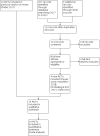
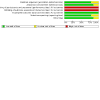
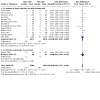

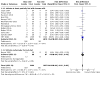


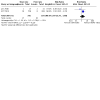


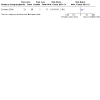

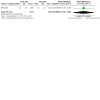
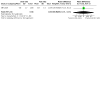
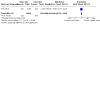


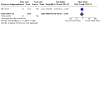
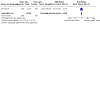
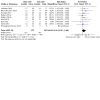
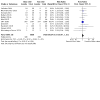
Update of
-
Slow advancement of enteral feed volumes to prevent necrotising enterocolitis in very low birth weight infants.Cochrane Database Syst Rev. 2017 Aug 30;8(8):CD001241. doi: 10.1002/14651858.CD001241.pub7. Cochrane Database Syst Rev. 2017. Update in: Cochrane Database Syst Rev. 2021 Aug 24;8:CD001241. doi: 10.1002/14651858.CD001241.pub8. PMID: 28854319 Free PMC article. Updated.
References
References to studies included in this review
Caple 2004 {published data only}
Fayyaz 2020 {published data only}
-
- Fayyaz M, Haider S, Khan AH, Nazir S, Hassan A, Hussain S. Comparison of slow versus rapid feeding regimen in preterm neonates in the reduction of hospital stay. Journal of Rawalpindi Medical College 2020;24(3):249-53. [DOI: 10.37939/jrmc.v24i3.1384] - DOI
Hasshemi 2018 {published data only}
-
- Hasshemi F, Mostafa Gharehbaghi M, Ghojazadeh M, Sanaie G. Comparing outcomes of different feeding volumes in preterm infants. Journal of Urmia University of Medical Sciences 2013;24(1):58-64. [ISSN: 1027-3727] [umj.umsu.ac.ir/article-1-1628-en.html]
Jain 2016 {published data only}
-
- Mukhopadhyay K, Jain S. Feed intolerance and necrotising enterocolitis in rapid vs slow feeding in preterm neonates with absent end diastolic flow: a randomised controlled trial. In: Pediatric Academic Societies and Asian Society for Pediatric Research; 2014 May 3-6; Vancouver. 2014. [CENTRAL: CN-01344272]
Karagol 2013 {published data only}
-
- Karagol BS, Zenciroglu A, Okumus N, Polin RA. Randomized controlled trial of slow versus rapid enteral feeding advancements on the clinical outcomes of preterm infants with 750-1250g. Journal of Parenteral and Enteral Nutrition 2013;37(2):223-8. [DOI: 10.1177/0148607112449482] [PMID: ] - DOI - PubMed
Krishnamurthy 2010 {published data only}
Modi 2015 {published data only}
-
- Modi M, Ramji S, Jain A, Kumar P, Gupta N. Early aggressive enteral feeding in neonates weighing 750–1250 grams: a randomized controlled trial. Indian Pediatrics 2019;56(4):294-8. [PMID: ] - PubMed
-
- Modi M, Ranji S, Jain A, Sharma P, Gupta N. A randomised trial of aggressive feeding regimen in infants with birth weight ≤ 1250 grams. In: Pediatric Academic Societies Annual Conference; 2015 Apr 25-28; San Diego, CA. 2015. [CENTRAL: CN-01344271]
Montealegre‐Pomar 2021 {published data only}
-
- Montealegre‐Pomar AP, Bertolotto-Cepeda AM, Romero-Marquez Y, Munoz-Ramirez KJ. Effectiveness and safety of fast enteral advancement in preterm infants between 1000 and 2000 g of birth weight. Journal of Parenteral and Enteral Nutrition 2021;45(3):578-86. [DOI: 10.1002/jpen.1925] [PMID: ] - DOI - PubMed
Raban 2014a {published data only}
-
- Raban MS, Santhakumaran S, Keraan Q, Joolay Y, Uthaya S, Horn AR, et al. A randomised controlled trial of high or low volume initiation and rapid or slow advancement of milk feeds for infants ≤ 1000 g. In: South African Paediatric Association Congress; 2014 Sept 10-14; Cape Town. 2014.
-
- Raban S, Santhakumaran S, Keraan Q, Joolay Y, Uthaya S, Horn A, et al. A randomised controlled trial of high vs low volume initiation and rapid vs slow advancement of milk feeds in infants with birthweights ≤ 1000 g in a resource-limited setting. Paediatrics and International Child Health 2016;36(4):288-95. [DOI: 10.1179/2046905515Y.0000000056] [PMID: ] - DOI - PubMed
Raban 2014b {published data only}
-
- Raban MS, Santhakumaran S, Keraan Q, Joolay Y, Uthaya S, Horn AR, et al. A randomised controlled trial of high or low volume initiation and rapid or slow advancement of milk feeds for infants ≤ 1000 g. In: South African Paediatric Association Congress; 2014 Sept 10-14; Cape Town. 2014.
-
- Raban S, Santhakumaran S, Keraan Q, Joolay Y, Uthaya S, Horn A, et al. A randomised controlled trial of high vs low volume initiation and rapid vs slow advancement of milk feeds in infants with birthweights ≤ 1000 g in a resource-limited setting. Paediatrics and International Child Health 2016;36(4):288-95. [DOI: 10.1179/2046905515Y.0000000056] [PMID: 26369284] - DOI - PubMed
Rayyis 1999 {published data only}
Saha 2019 {published data only}
-
- Saha LC, Yaesmin R, Hoque M, Chowdhury MA. Slow versus rapid advancement of enteral feeding in preterm infants less than 34 weeks: a randomized controlled trial. Journal of Neonatology and Clinical Pediatrics 2019;6:029. [DOI: 10.24966/NCP-878X/100029] - DOI
Salhotra 2004 {published data only}
-
- Salhotra A, Ramji S. Slow versus fast enteral feed advancement in very low birth weight infants: a randomized control trial. Indian Pediatrics 2004;41(5):435-41. [PMID: ] - PubMed
SIFT 2016 {published data only}
-
- SIFT Investigators Group. SIFT: Outcomes at discharge. In: BAPM Annual General & Scientific Meeting; 2016 Sep 15-16; Watershed, Bristol. 2016.
-
- SIFT Investigators Group. SIFT: Speed of increasing feeds trial. In: Hot Topics in Neonatology Annual Meeting; 2016 Dec 5-7; Washington, DC. 2016.
-
- SIFT Investigators Group. The Speed of Increasing milk Feeds Trial (SIFT); results at hospital discharge. In: Pediatric Academic Societies Annual Meeting; 2017 May 6-9; San Francisco, CA. 2017. [registration.pas-meeting.org/2017/reports/rptPAS17_Abstracts.asp]
References to studies excluded from this review
Ahmed 2020 {published data only}
-
- Ahmed F, Dey SK, Shahidullah M, Mannan MA, Raj AY, Sharmin S. Early versus delayed enteral feeding for achieving full feeding in preterm growth-restricted infants: a randomized clinical trial. Mymensingh Medical Journal 2020;29(3):638-45. - PubMed
Berseth 2003 {published data only}
Book 1976 {published data only}
Gray 2017 {published data only}
Ibrahim 2017 {published data only}
-
- Ibrahim NR, Kheng TH, Nasir A, Ramli N, Foo JLK, Syed Alwi SH, et al. Two-hourly versus 3-hourly feeding for very low birthweight infants: a randomised controlled trial. Archives of Disease in Childhood - Fetal and Neonatal Edition 2017;102(3):F225-9. [DOI: 10.1136/archdischild-2015-310246] [PMID: ] - DOI - PubMed
Jayaraman 2017 {published data only}
Kadam 2016 {published data only}
-
- Kadam RM, Prasad VS, Santosh M. Rapid versus slow advancement of feeds in preterm babies less than 34 weeks in incidence of NEC and feed intolerance. Journal of Neonatal Biology 2016;5(1):1000214. [DOI: 10.4172/2167-0897.1000214] - DOI
Nangia 2019 {published data only}
Tewari 2018 {published data only}
-
- Tewari VV, Dubey SK, Kumar R, Vardhan S, Sreedhar CM, Gupta G. Early versus late enteral feeding in preterm intrauterine growth restricted neonates with antenatal doppler abnormalities: an open-label randomized trial. Journal of Tropical Pediatrics 2018;64(1):4-14. [DOI: 10.1093/tropej/fmx018] [PMID: ] - DOI - PubMed
Additional references
Battersby 2018
Bernstein 2000
-
- Bernstein IM, Horbar JD, Badger GJ, Ohlsson A, Golan A. Morbidity and mortality among very-low-birth-weight neonates with intrauterine growth restriction. The Vermont Oxford Network. American Journal of Obstetrics and Gynecology 2000;182(1 Pt 1):198-206. [DOI: 10.1016/s0002-9378(00)70513-8] [PMID: ] - DOI - PubMed
Berrington 2012
Bertino 2009
-
- Bertino E, Giuliani F, Prandi G, Coscia A, Martano C, Fabris C. Necrotizing enterocolitis: risk factor analysis and role of gastric residuals in very low birth weight infants. Journal of Pediatric Gastroenterology and Nutrition 2009;48(4):437-42. [DOI: 10.1097/mpg.0b013e31817b6dbe] [PMID: ] - DOI - PubMed
Cobb 2004
Conde‐Agudelo 2016
de Waard 2018
-
- Waard M, Li Y, Zhu Y, Ayede AI, Berrington J, Bloomfield FH, et al. Time to full enteral feeding for very low-birth-weight infants varies markedly among hospitals worldwide but may not be associated with incidence of necrotizing enterocolitis: the NEOMUNE-NeoNutriNet cohort study. Journal of Parenteral and Enteral Nutrition 2018;43:658-67. [DOI: 10.1002/jpen.1466] [PMID: ] - DOI - PMC - PubMed
Dorling 2005
Embleton 2013
Embleton 2017
Flidel‐Rimon 2004
Flidel‐Rimon 2006
Garite 2004
GRADEpro GDT [Computer program]
-
- GRADEpro GDT. Version accessed 12 May 2021. Hamilton (ON): McMaster University (developed by Evidence Prime), 2020. Available at gradepro.org.
Härtel 2009
-
- Härtel C, Haase B, Browning-Carmo K, Gebauer C, Kattner E, Kribs A, et al. Does the enteral feeding advancement affect short-term outcomes in very low birth weight infants? Journal of Pediatric Gastroenterology and Nutrition 2009;48(4):464-70. [DOI: 10.1097/MPG.0b013e31818c5fc3] [PMID: ] - DOI - PubMed
Hay 2018
Henderson 2009
Hickey 2018
Higgins 2011
-
- Higgins JP, Altman DG, Sterne JA: on behalf of the Cochrane Statistical Methods Group and the Cochrane Bias Methods Group. Chapter 8: Assessing risk of bias in included studies. In: Higgins JP, Green S, editor(s). Cochrane Handbook for Systematic Reviews of Interventions Version 5.1.0 (updated March 2011). The Cochrane Collaboration, 2011. Available from training.cochrane.org/handbook/archive/v5.1/.
Higgins 2021
-
- Higgins JP, Thomas J, Chandler J, Cumpston M, Li T, Page MJ, Welch VA, editor(s). Cochrane Handbook for Systematic Reviews of Interventions Version 6.2 (updated February 2021). Cochrane, 2021. Available from training.cochrane.org/handbook. - PMC - PubMed
Horbar 2012
Klingenberg 2012
Leaf 2013
Luig 2005
-
- Luig M, Lui K, NSW & ACT NICUS Group. Epidemiology of necrotizing enterocolitis - part II: risks and susceptibility of premature infants during the surfactant era: a regional study. Journal of Paediatrics and Child Health 2005;41(4):174-9. [DOI: 10.1111/j.1440-1754.2005.00583.x] [PMID: ] - DOI - PubMed
Maas 2018
Martin 2010
Mihatsch 2002
Morgan 2013a
Morgan 2014a
Pammi 2017
Patole 2005
-
- Patole SK, Klerk N. Impact of standardised feeding regimens on incidence of neonatal necrotising enterocolitis: a systematic review and meta-analysis of observational studies. Archives of Disease in Childhood - Fetal and Neonatal Edition 2005;90(2):F147-51. [DOI: 10.1136/adc.2004.059741] [PMID: ] - DOI - PMC - PubMed
Premji 2011
Quigley 2019
Samuels 2017
Sankar 2008
Schünemann 2013
-
- Schünemann H, Brożek J, Guyatt G, Oxman A, editor(s). Handbook for grading the quality of evidence and the strength of recommendations using the GRADE approach (updated October 2013). GRADE Working Group, 2013. Available from gdt.guidelinedevelopment.org/app/handbook/handbook.html.
Shah 2012
-
- Shah TA, Meinzen-Derr J, Gratton T, Steichen J, Donovan EF, Yolton K, et al. Hospital and neurodevelopmental outcomes of extremely low-birth-weight infants with necrotizing enterocolitis and spontaneous intestinal perforation. Journal of Perinatology 2012;32(7):552-8. [DOI: 10.1038/jp.2011.176] [PMID: ] - DOI - PMC - PubMed
Soll 2019
-
- Soll RF, McGuire W. Evidence-based practice: improving the quality of perinatal care. Neonatology 2019;116(3):193-8. - PubMed
Tyson 2007
Walsh 1986
Walsh 2019
Walsh 2020
References to other published versions of this review
McGuire 2008
Morgan 2011
Morgan 2013b
Morgan 2014b
Morgan 2015
Publication types
MeSH terms
LinkOut - more resources
Full Text Sources
Miscellaneous

